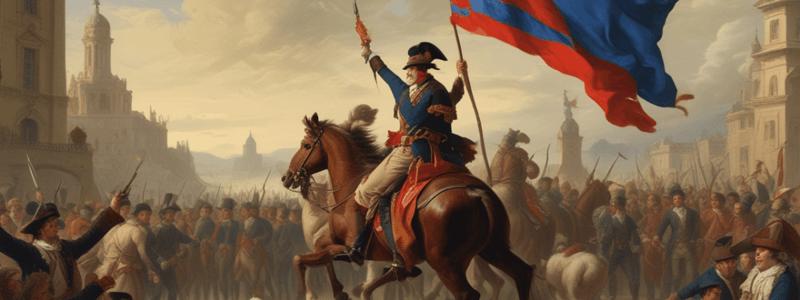Podcast
Questions and Answers
What was the primary reason for France's deep debt?
What was the primary reason for France's deep debt?
- Excessive spending on education and infrastructure
- High taxes on the nobility and clergy
- Wars and extravagance of the monarchy (correct)
- Loss of colonies in the New World
Which of the following was NOT a cause of the French Revolution?
Which of the following was NOT a cause of the French Revolution?
- Enlightenment Ideas
- The American Revolution (correct)
- Social Inequality
- Food Shortages
What was the significance of the Tennis Court Oath?
What was the significance of the Tennis Court Oath?
- It was a declaration of war against Great Britain
- It led to the execution of King Louis XVI
- It marked the end of the monarchy
- It was a vow to continue working on a new constitution (correct)
What event marked the beginning of the French Revolution?
What event marked the beginning of the French Revolution?
What was the main goal of the Declaration of the Rights of Man and of the Citizen?
What was the main goal of the Declaration of the Rights of Man and of the Citizen?
Who led the radical Jacobins during the Reign of Terror?
Who led the radical Jacobins during the Reign of Terror?
Flashcards are hidden until you start studying
Study Notes
Causes of the French Revolution
- Financial Crisis: France was deeply in debt from wars and extravagance of the monarchy
- Social Inequality: The Estates-General system divided society into three estates: clergy, nobility, and commoners; the third estate was burdened with heavy taxes and few rights
- Enlightenment Ideas: Philosophers like Rousseau, Voltaire, and Montesquieu spread ideas of liberty, equality, and democracy, inspiring the masses
- Food Shortages: Crop failures and food shortages worsened the economic situation, leading to widespread discontent
Key Events of the French Revolution
- Estates-General (May 1789): Representatives of the three estates gathered to address the financial crisis, but the third estate broke away to form the National Assembly
- Tennis Court Oath (June 1789): National Assembly members vowed to continue their work on a new constitution
- Storming of the Bastille (July 1789): A symbol of the monarchy, the prison was attacked and destroyed, marking the beginning of the revolution
- Great Fear (July-August 1789): Panic and violence spread throughout the countryside as peasants attacked noble and aristocratic property
- Declaration of the Rights of Man and of the Citizen (August 1789): A document outlining individual liberties and democratic principles
- Reign of Terror (1793-1794): Radical Jacobins, led by Maximilien Robespierre, executed thousands of perceived enemies of the revolution
- Rise of Napoleon (1796-1799): A military general who seized power and eventually became Emperor of France
Key Figures
- King Louis XVI: The monarch whose reign ended with his execution in 1793
- Queen Marie Antoinette: Symbol of the monarchy and target of popular hatred
- Maximilien Robespierre: Radical Jacobin leader during the Reign of Terror
- Napoleon Bonaparte: Military general who rose to power and became Emperor of France
- Georges Danton: Early leader of the revolution and founder of the Cordeliers Club
Causes of the French Revolution
- France was deeply in debt from wars, including the Seven Years' War and the American Revolutionary War, and the extravagance of the monarchy.
- The Estates-General system created a social hierarchy, dividing society into three estates: clergy, nobility, and commoners, with the third estate shouldering heavy taxes and few rights.
- Enlightenment ideas, spread by philosophers like Rousseau, Voltaire, and Montesquieu, inspired the masses with concepts of liberty, equality, and democracy.
- Crop failures and food shortages worsened the economic situation, leading to widespread discontent and inflation.
Key Events of the French Revolution
The Early Years
- The Estates-General, formed in May 1789, was a gathering of representatives from the three estates to address the financial crisis.
- The National Assembly was formed in June 1789 when the third estate broke away from the Estates-General.
- The Tennis Court Oath, taken in June 1789, was a vow by National Assembly members to continue their work on a new constitution.
The Fall of the Monarchy
- The Storming of the Bastille, a symbol of the monarchy, on July 14, 1789, marked the beginning of the revolution.
- The Great Fear, a period of panic and violence, spread throughout the countryside from July to August 1789 as peasants attacked noble and aristocratic property.
The Rise of the Revolution
- The Declaration of the Rights of Man and of the Citizen, adopted in August 1789, outlined individual liberties and democratic principles.
- The Reign of Terror, from 1793 to 1794, was a period of radical violence led by Maximilien Robespierre, resulting in the execution of thousands of perceived enemies of the revolution.
The Rise of Napoleon
- Napoleon Bonaparte, a military general, seized power in 1796 and eventually became Emperor of France.
Key Figures
- King Louis XVI, the monarch whose reign ended with his execution in 1793, was a symbol of the absolute monarchy.
- Queen Marie Antoinette, the wife of King Louis XVI, was a target of popular hatred and a symbol of the monarchy's excesses.
- Maximilien Robespierre, the radical Jacobin leader, was a key figure during the Reign of Terror.
- Napoleon Bonaparte, the military general, rose to power and became Emperor of France, marking the end of the French Revolution.
- Georges Danton, an early leader of the revolution, was a founder of the Cordeliers Club and a key figure in the early years of the revolution.
Studying That Suits You
Use AI to generate personalized quizzes and flashcards to suit your learning preferences.




